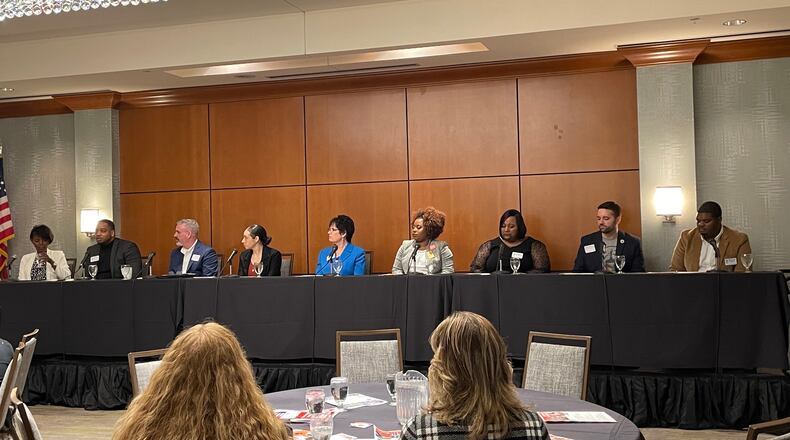They also talked about the YWCA’s mission of eliminating racism.
YWCA Hamilton Director of Racial Justice Charla Hale talked about her role in eliminating racism, a large undertaking that can be accomplished by starting with key areas that need equity and justice “in order to live our full, realized selves.” The areas are education, healthcare, and civic engagement.
Racial struggles with education are not a Hamilton issue, but rather a national one as “all schools struggle with having retention with black and brown educators, success for minority students, and disparities in discipline.”
Students of color are less likely to be in honors classes, and more likely to be expelled or suspended.
“All of our students start at the same level when they come in kindergarten yet something happens when it’s time to cross that stage that all of those disparities are made more apparent,” Hale said. “So how do we support policy change, and how do we help recruit and retain teachers of color because we know that makes a difference. And truly walk alongside our districts to create this awesome and inclusive environment because I truly believe we have great educators here and how do we bring in even more great educators into the region.”
In terms of healthcare, infant and maternal mortality rates among Black and Latino babies and women are significantly higher than in white babies and women. Hale said it’s key to collaborate with healthcare partners to reduce disparities “because with all things fixed and equal ― whether that’s income, whether that’s geographic location ― that disparity still exists.”
Starting Monday, the YWCA Hamilton is launching its Standing Against Racism Challenge, which is an opportunity to engage in conversations about racial justice. Monday evening, the Stand Against Racism Challenge will have a keynote conversation at the Hamilton Branch of the Lane Public Library, 300 North Third St., with Dr. Bennyce Hamilton, the director of Miami Regionals Center for Diversity, Equity, and Inclusion.
Hale said weekly throughout April, those who sign up will get an email with links to podcasts, videos, and articles to give people an opportunity to “reflect on the impact of racism in our community, and learn more about how you can get involved and engaged.”
Each Thursday in April, the YWCA will have a virtual conversation to discuss what people learned, as well as how it applies to the community and what they can do about it.
“At the end of the day, we’re all impacted by the trauma of racism and we all have a duty to eliminate it,” Hale said.
Developmental disabilities was another aspect of diversity discussed Thursday.
It took legislation in 1986 for people with developmental disabilities to have their freedoms legally reinforced, said Butler County Board of Developmental Disabilities Superintendent Lisa Guiliano. The Ohio legislature in the 1980s included a bill of rights that included 24 rights to be able to choose and experience life.
“It’s always been difficult for me to accept that people with disabilities needed additional protection under the law to simply be treated equally as all citizens,” she said. “Given that reality, our board’s mission focuses on supporting people to live, work, and learn in their community. What that looks like is different for every person depending on their goals and dreams for the future.”
Guiliano the goal of advocates for the developmentally disabled “is an honorable one” and it’s “vitally important given the history of people with disabilities living in institutions and being hidden from the community just for being different.”
Taylor Stone-Welch, the chair of Hamilton Ohio Pride, said his organization was formed in 2019 with the goal of not only creating a Pride event but activism and advocacy for the LGBTQ community.
“Pride is important to me because as a young person growing up in town, I thought that I couldn’t live in Hamilton,” said the lifelong Hamiltonian. “I didn’t see people like me who were living their authentic selves in this community, and by creating an event like Pride and doing activism and advocacy in this town, I believe we’re going to help young people who are a little different, maybe like they don’t fit in, maybe see themselves in this community.”
A lot of Stone-Welch’s friends move out of Hamilton, and he thought he’d do the same when he went to college believing that was a stepping stone to going to a large city “where I thought that’s where a gay person needed to go.” Life circumstances resulted in his return to Hamilton, and that ended up being “a really good thing for me.”
He fell in love with the down, met his husband here and “we plan on spending our whole lives here.”
He said DEI initiatives when it comes to gender identity and sexual orientation “can help us retain young talent and that different perspective that we all need here. It also helps us attract young talent for an employee base.”
“The younger generations value diversity to a high degree, I believe a lot of young people don’t want to work for a company that they don’t believe they walk the walk and stand behind their diversity initiatives,” Stone-Welch said.
About the Author

